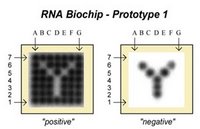Aptamers vs. Antibodies--Early Cancer Detection
 Aptamers offer the utility for biotechnological and therapeutic applications as they offer molecular recognition properties that rival that of the commonly used biomolecule, antibodies. In addition to their discriminate recognition, aptamers offer advantages over antibodies as they can be engineered completely in a test tube, are readily produced by chemical synthesis, possess desirable storage properties, and elicit little or no immunogenicity in therapeutic applications. Source.
Aptamers offer the utility for biotechnological and therapeutic applications as they offer molecular recognition properties that rival that of the commonly used biomolecule, antibodies. In addition to their discriminate recognition, aptamers offer advantages over antibodies as they can be engineered completely in a test tube, are readily produced by chemical synthesis, possess desirable storage properties, and elicit little or no immunogenicity in therapeutic applications. Source.Aptamers are relatively short molecules (15-50 bases) of RNA, DNA or synthetic analogs that are designed to bind tightly and specifically to target molecules such as proteins. Aptamers can display highly specific binding due to the complex three-dimensional conformations short oligonucleotides can adopt. As these conformations are directly dependent upon primary sequence, synthetic or "genetic evolution" selection techniques can theoretically be used to generate aptamers with almost any specific binding characteristic, especially for any protein.
....Aptamers may someday emerge as an alternative or complement to antibodies as research reagents and diagnostic sensors. It is possible that aptamers may be designed to target proteins for capture and measurement assays, as well as, bind to specific regions of proteins as "agonists" or "antagonists" for functional research. The potential diagnostic use of aptamers for in vivo imaging is also under investigation. However, prior to more widespread use, the technology must be developed to more accurately and efficiently bind specific target proteins and regions. Source.
Now researchers at the University of Florida have developed aptamers that can diagnose leukemic cells at an early stage, even distinguish between types of cancerous leukocytes:
“Normally, definitive diagnosis of cancer requires a visual examination of the tumor, which is an invasive and time-consuming process,” explained Weihong Tan, a UF professor of chemistry and lead author of the paper. “Most importantly, this process is not suitable for early detection, when the cancer is at its most treatable.”Source.
Clinicians can sometimes use antibodies, proteins that recognize and fight bodily intruders, to identify different types of cancer. That’s the case, for example, with the prostate-specific antigen test for prostate cancer. Antibodies are preferable to diagnosis by appearance because they are consistent and accurate, but they are only available for a selected few cancers, Li said.
Tan, a member of the UF Shands Cancer Center and the UF Genetics Institute, said that scientists know that cancer tissue has a unique molecular fingerprint that can distinguish it from healthy tissue. But attempts to target cells via these fingerprints have largely proved futile because there are few molecular tools to recognize the fingerprints. The UF team sought to create these tools in the form of aptamers, or short strands of chemically synthesized DNA. These aptamers exploit the differences on the surface of cells to discern cancerous ones. Key to the approach is it does not require prior knowledge of cancer indicators, Tan said.
“Using the cell-based aptamer selection strategy, we can generate aptamers which can specifically recognize any kind of cells without prior knowledge of molecular changes associated with the disease,” he said.
In experiments, the researchers showed they could successfully design sets of aptamers that would recognize leukemia cells that had been mixed in with normal bone marrow cells. The aptamers also successfully distinguished leukemia T-cells from lymphoma B-cells. Both results indicate that the aptamer method could be used to identify many different types of cancer, researchers said.
Clinicians using such molecular probes should be able to “find cancer in a much earlier stage when the tumors are much smaller,” enabling doctors to begin treatment earlier, Li said.
Early diagnosis of cancer cells using aptamers and/or advanced antibodies, can make cancer screening more accurate, and can bring about earlier diagnosis of cancers. Combining earlier diagnosis with safer and more effective non-invasive cancer treatments, will lead to fewer cancer deaths and less traumatic cancer therapies.
Labels: cancer, proteomics

0 Comments:
Post a Comment
“During times of universal deceit, telling the truth becomes a revolutionary act” _George Orwell
<< Home